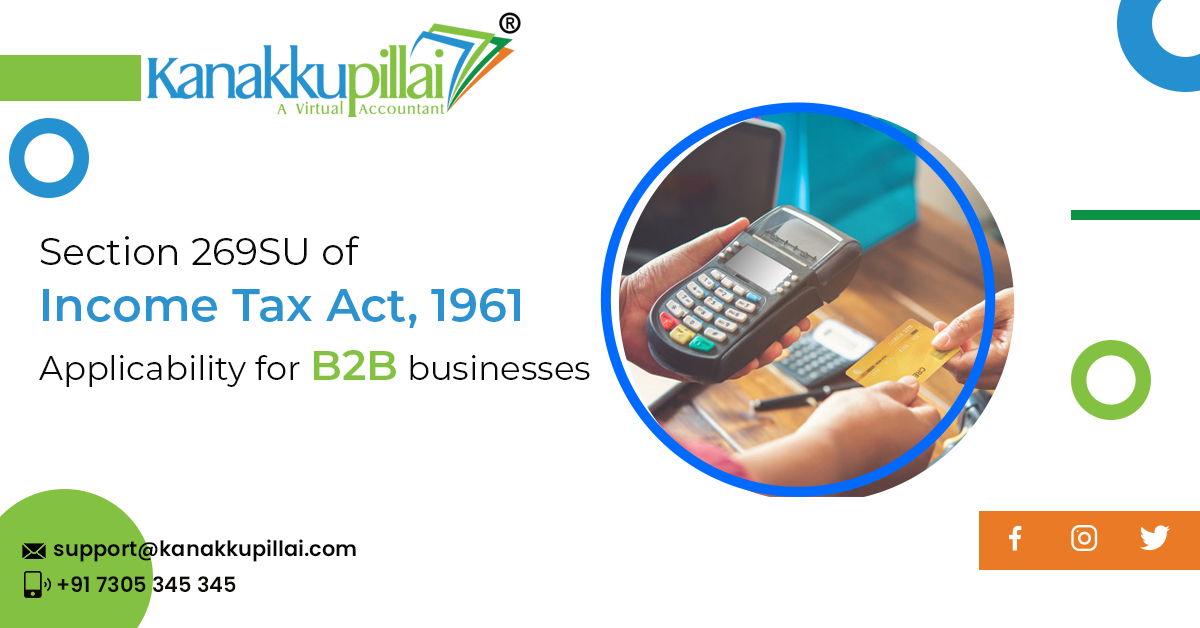Section 269SU of the Income Tax Act, 1961 – Applicability for B2B businesses, The Finance Act, 2019, inserted section 269SU (Acceptance of payment through prescribed electronic modes) with effect from 1st November 2019. The section provides that every person carrying on business shall (mandatorily) provide the facility to make payments through prescribed electronic modes, apart from other electronic modes of payment. This provision applies to those persons whose total sales/ turnover or gross receipts from the business exceeds (is greater than) Rs. 50 crores in the immediately preceding previous year.
Section 269SU prescribes the electronic modes for payments acceptance that an individual who is engaged in business has to provide in addition to the other electronic facility or digital mode of payment already available for the customers.
For example, Section 269SU of the Income Tax Act, 1961 shall apply to a person in the current financial year 2020-21 if his total sales/ turnover or gross receipts were greater than Rs. 50 crores in the previous financial year, 2019-20. For this section, the prescribed electronic modes notified by the government under rule 119AA (Modes of payment for section 269SU) are as follows:
(1) Debit card powered by RuPay
(2) Unified Payments Interface (UPI)
(3) Unified Payments Interface Quick Response Code (UPI QR Code)
The main intention of Section 269SU of the Income Tax Act of 1961 seems to be promoting digital payments in India. However, the drawback arises for those persons who carry on B2B businesses. In case of persons carrying on B2C businesses, they directly interact with the retail consumers, where the payment amounts involved in the transactions may be low compared to those persons having B2B businesses. The drawback is mainly because the above-notified modes of payment come with a payment limit, as follows:
| S. No. |
Modes of Payment under Rule 119AA |
The maximum limit for payment |
|---|---|---|
| 1. | Debit card powered by RuPay | Limit set by cardholder. |
| 2. | UPI | Rs. 40,000/- per transaction and per day for one bank account |
| 3. | UPI QR Code | Rs. 40,000/- per transaction and per day for one bank account. |
Since B2B businesses deal with large payment amounts, they generally use other electronic modes of payment, such as NEFT or RTGS. The above-prescribed electronic modes, which have maximum limits, make it practically impossible for persons carrying B2B businesses to use them. If implemented as mandated by Section 269SU of the Income Tax Act, 1961, they would serve no or extremely little purpose for those businesses. It would also cause administrative inconvenience and impose additional costs for the business. Not implementing this may also lead to the payment of unnecessary penalties under section 271DB. It also must file the income tax returns before the notified due date or face issues.
However, keeping all these constraints in mind, the Central Board of Direct Taxes released a circular (Circular No. 12/2020) dated 20th May 2020, clarifying that the provisions of section 269SU of the Income Tax Act shall not apply to those who satisfy the following conditions:
(i) Persons having only B2B transactions (no transaction with retail consumers); and
(ii) If at least 95% of the total amounts received during the previous year for sales, turnover, or gross receipts are received by any mode other than cash.
To summarize, the provisions of Section 269SU of the Income Tax Act, 1961 shall apply to all persons carrying on B2C businesses and having total sales/ turnover or gross receipts exceeding Rs. 50 crores in the previous year. When it comes to persons carrying on B2B businesses, it depends on whether the total sales/ turnover or gross receipts condition given in the section and the additional conditions given in the relevant circular are satisfied or not, which can be presented as follows:
Section 269SU of the Income Tax Act, 1961 – Applicability for B2B businesses






